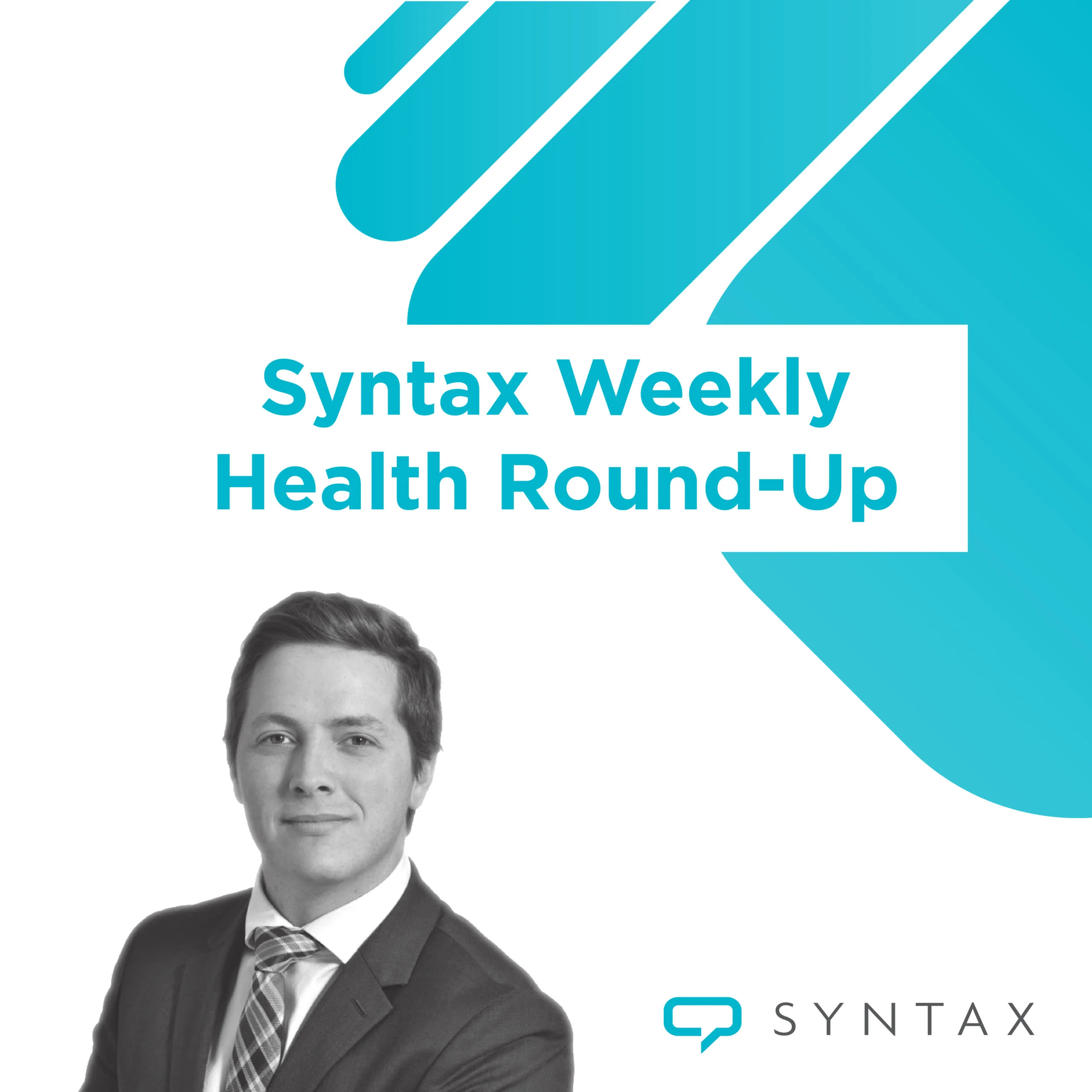Insights | Blog
Thin Orange Line Drawn on Pharmacare
Ontario signs its bilateral health funding agreement, and Jagmeet Singh puts the Liberals on notice for pharmacare while Minister Holland pushes for some restraint. On that, and more, here is your Syntax Weekly Health Round-Up.
On the Hill
- At the Standing Committee on Health (HESA), MPs resumed consideration of draft reports for their studies into the Patented Medicine Prices Review Board and Children’s Health.
- In the House of Commons, Health Minister Mark Holland introduced Bill C-62, An Act to amend An Act to amend the Criminal Code (medical assistance in dying), No. 2. As mentioned previously, the Bill delays further expansion of medical assistance in dying (MAID) until 2027 and establishes the parameters for a parliamentary review of MAID eligibility for persons whose sole underlying medical condition is a mental illness. A Joint Committee of both Houses of Parliament must begin such a review within two years of Bill C-62 receiving Royal Assent.
- NDP Leader Jagmeet Singh disclosed in an appearance at Toronto Metropolitan University that he’s taken significant flack from partisans for working with the Liberal government. Singh pushed back on the notion, suggesting that without his maneuvering the government would not have passed dental care legislation. But Singh also went further, adding that the (previously delayed) deadline of March 1 to introduce legislation to advance pharmacare is a make-or-break deadline for the NDP’s continued support of the government through the supply and confidence agreement. This does not mean that the NDP would necessarily vote against the government on confidence matters, but rather that it would do so on a case-by-case basis moving forward.
Around Government
- With Alberta having announced its plans to bring forward the most stringent legislation to date on LGBTQ2SIA+ youth in the province, federal cabinet ministers have sounded off on what they are framing as “the most draconian and harmful policies for young people in the country.” This has led to Conservative Leader Pierre Poilievre intervening on Premier Danielle Smith’s behalf, saying the Liberal government and the media have demonized her for policies that would give parents more say over their kids. His message to the federal government is to “butt out” of the issue and allow province and territories to run schools and hospitals.
- Speaking to reporters about the development of legislation to establish a framework for pharmacare, Health Minister Mark Holland remarked that the country’s current fiscal framework and its ability to absorb massive costs must be considered as the government approaches the March 1 deadline under the supply and confidence agreement to table legislation. While the objective remains to make drugs more affordable and identify definitive actions that can be taken to do so, the Minister remains steadfast in the position that the government cannot simply spend “enormous amounts of money” on a new program.
- Speaking one year after the announcement of a new Canada Health Transfer, Minister Holland noted that while many are looking for governments to move faster, the federal government is not looking into implementing a “placebo policy.” Holland noted that while only four provinces have signed bilateral agreements with the federal government under the renewed Canada Health Transfer, he’s given all provinces and territories until March to strike a deal to access dedicated funding to tackle specific issues. This would go to support areas such as community care, mental health, health human resources, and modernizing the health system.
- Health Canada announced further details on the oral healthcare services that will be covered under the Canadian Dental Care Plan (CDCP), the majority of which will be available by May 2024. The CDCP will cover up to a certain established fee for preventative, diagnostic, restorative, endodontic, prosthodontic, periodontal, and oral surgery services, some of which will require preauthorization.
Around the Dominion
- The Government of Ontario and the federal government announced a bilateral funding agreement of $3.1 billion under the renegotiated Canada Health Transfer. To reach the agreement, the Province had to submit its three-year action plan which details how it will create new primary healthcare teams, open another 700 spots in medical education programs, and improve its tracking and reporting of health system data. The funding will also help Ontario address health human resources issues by supporting students with tuition fees, helping practising professionals gain new skills, and bringing more health workers into the field by removing barriers to foreign credential recognition, simplifying licensing processes, and increasing program access for highly educated and skilled health professionals.
- Also in Ontario, the government announced an investment of over $2.6 million to connect Indigenous communities to mental health and addictions supports. The funding directed to the Nishnawbe Aski Nation, which represents 49 First Nations and approximately 45,000 Indigenous people, will support community-driven programs, school-based programs, crisis teams, and mobile response units. The province also announced a $5.6-million boost in funding to expand pediatric services in the Peel and Halton regions. The $5.6 million in additional funding will support programs and services at the ErinoakKids Centre for Treatment and Development, Halton Healthcare, and the Mississauga Ontario Health Team.
- The Premier of Manitoba continued his listening tour consultations with a stop at the Selkirk Mental Health Centre to hear the experiences of those on the front lines. The listening tour will continue with trips to Health Sciences Centre Winnipeg, Victoria General Hospital, Brandon Regional Health Centre, Bethesda Regional Health Centre, and Thompson General Hospital.
- In B.C., the government announced new action to restrict sales of buccal nicotine-pouch products, which can now be sold only by a pharmacist on a non-prescription basis. The purpose is to protect youth from nicotine use and dependency. The new rules came into effect on February 7 through amendments to the Drug Schedules Regulation that require buccal nicotine-pouch products to be kept behind the counter at pharmacies.


